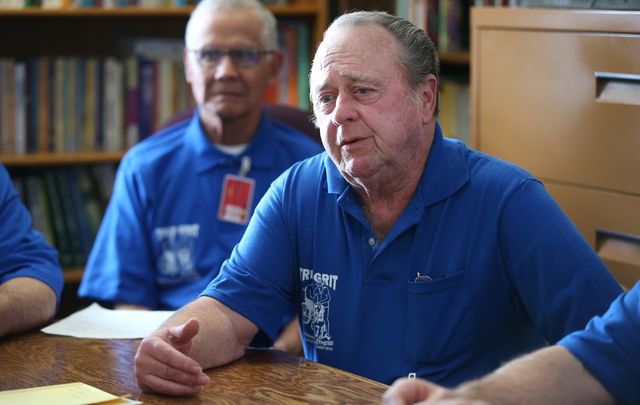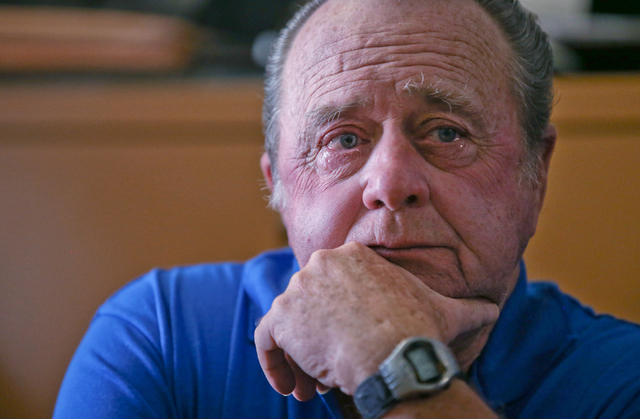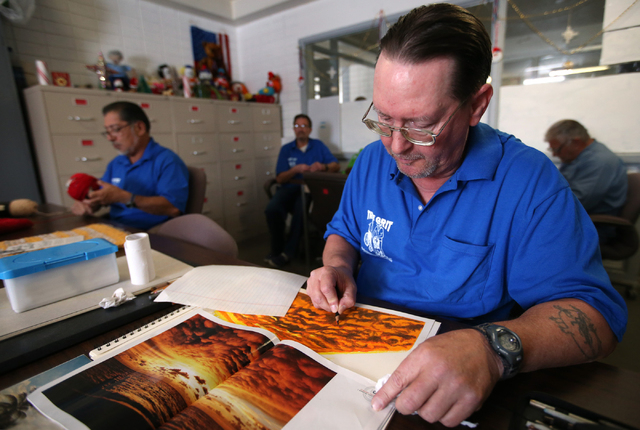Inmate is their name, True Grit is their gain
CARSON CITY — The last thing one would expect entering a cellblock at the Northern Nevada Correctional Center is to be serenaded by 170 older men.
But these men, all participants in the prison’s Senior Structured Living Program, or True Grit program for inmates 55 and older, are singing the “Battle Hymn of the Republic,” including the largely unknown second and third verses. Theirs is a stirring version that makes one feel like Abraham Lincoln watching the Union troops returning from battle.
Later on this day a group of inmates sings “La Bamba.” Guitarist Bill — prison rules require inmates to give only their first names — mentions he played in Nashville, Tenn., and spent five years on the “Hee Haw” television show. It’s not Elvis Presley singing “Jailhouse Rock,” but a reasonable facsimile.
Singing is a form of therapy for these associated burglars, killers, drug salesmen and rapists, said senior psychologist Mary Harrison, who runs the program.
The inmates also are here to help each other with their problems. If one man is feeling blue, then the others try to cheer him up and offer a different way of looking at problems.
Many of these men are Vietnam War veterans suffering from post-traumatic stress disorder. A few sit in wheelchairs. Most are friendly.
“The program saved my sanity,” said 59-year-old Steve. “The best thing about it is knowing I have people here who care.”
“We are all God’s children,” added 76-year-old Robert. “This is our extended family. People change in here.”
Brotherhood apparently is paying off. The recidivism rate among those who leave the prison after participating in the True Grit program is zero.
ON THE INSIDE
Nobody is locked in a cell. Inmates mingle with each other. Nearby is the Regional Medical Center where they can quickly get help for medical and psychological problems.
Some inmates are working on handicrafts. Others are knitting, beading, even crocheting and making small rugs for cats. All items they work with, including the guitars, have been donated.
Volunteers bring in their dogs to be petted. And inmates perform plays such as “12 Angry Men,” about a murder trial.
Every inmate is expected to perform some kind of work, even if it is just sweeping the floor. If they refuse, they are drummed out of the program and returned to the regular prison population. There is a waiting list of 100 inmates who want into True Grit.
There also is a requirement that they must be well-groomed. Upon entry into the program, inmates sign a contract to follow the requirements.
“We are at the cutting edge with this program,” said Warden Isidro Baca, who listens to the choir and walks around the cellblock talking with the inmates. “We are being recognized around the country.”
He said prison officials from other states and even Canada regularly visit to learn more about the program that Harrison started in 2004.
No other Nevada prison for men has a similar program, but there is a program for women inmates at the Florence McClure state women’s prison in North Las Vegas.
In 2011, Harrison became the first winner of the Dr. Mary Ann Quaranta Elder Justice Award at Fordham University in New York City for developing True Grit.
WITNESSED THE CHANGE
Reno resident Diane Arkell knows firsthand how the program has changed some participants for the better.
She said she put $100 in the prison bank account of a friend, a True Grit participant serving time for unarmed robbery. People can put funds in these accounts so men can purchase incidentals from the prison store.
“I put $100 on his books and I forgot to tell him,” she said.
Rather than just taking the money without any questions, the friend went to his counselor and said the money wasn’t his and the prison needed to correct the problem. Eventually everyone figured it out.
“That is huge,” she said about his response. “The ‘old friend’ would have just kept it and not said anything.”
Baca said the True Grit participants are not angels. Some are serving long sentences for sex crimes. If you are in prison in your 50s and 60s, then you likely have done something bad.
Many are serving life sentences and will die in prison.
Just two weeks ago, 86-year-old inmate Foster Gordon died at the Regional Medical Center where he had been confined for an extended period of time.
There have been numerous media reports in recent months about the seemingly large number of deaths in Nevada prisons, particularly at the Northern Nevada Correctional Center. Four inmates died here in October. Some deaths remain under investigation.
Nevada prisons house about 12,500 inmates, a number slightly less than the population of Boulder City.
Baca said sick inmates from across the state are sent here because of the prison’s health programs and the greater attention they can receive at the Regional Medical Center.
About 760 inmates in Nevada prisons are 60 and older. Fourteen are in their 80s.
Prison officials said there were 33 inmate deaths in 2013, or 0.25 percent of the prison population, compared to 42 deaths, or 0.33 percent of the population, in 2010.
STARTED OUT OF NEED
Harrison said she started the program out of concerns for the physical and mental needs of the graying prison population. She could see that older inmates often did not fit in with the regular prison population.
Few older inmates were active in prison programs and some just spent their days sleeping.
Before being admitted to True Grit, Harrison said an inmate “must take responsibility for his crimes. There are no programs for denial here.”
“It’s all about helping one another here,” she said. “On the outside they haven’t been in healthy relationships. We learn here how to have healthy relationships.”
Inmate Phil, 61, said what he has learned will help him when he leaves prison, he hopes in about 10 months.
“When we get out we know we have to ask for help when we need it,” he said. “We didn’t ask for help in the past.”
“This program has helped me become a better person,” said 57-year-old Raymond. “I thank God and Ms. Harrison.”
Contact Capital Bureau Chief Ed Vogel at evogel@reviewjournal.com or 775-687-3901. Follow him on Twitter at @edison vogel.
























